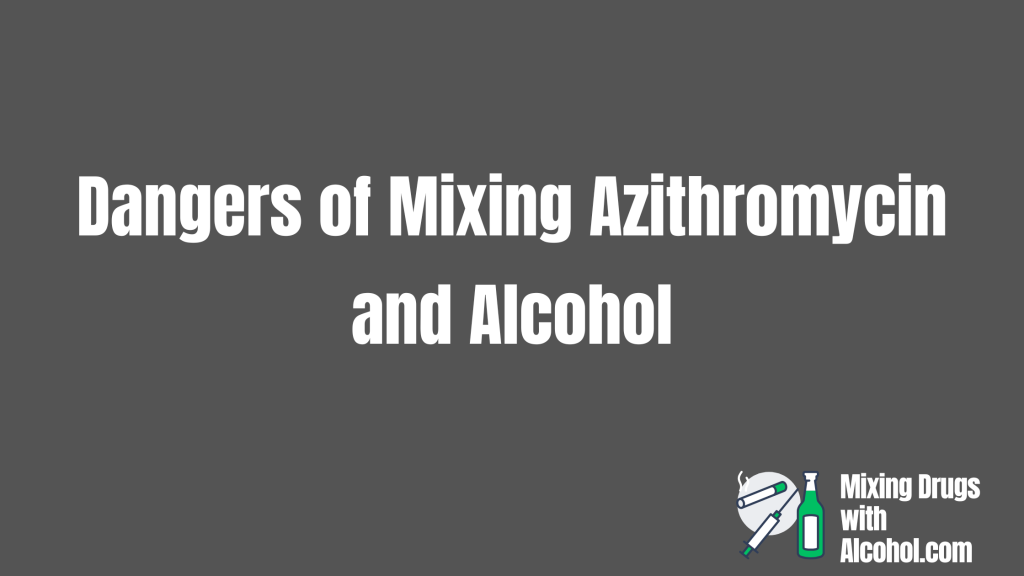Azithromycin is a popular antibiotic for bacterial infections due to its effectiveness and affordability.
However, combining it with alcohol may pose risks. It’s crucial to consider the potential dangers and make informed decisions regarding their usage.
This article provides a scientific overview of the interaction between alcohol and azithromycin, including side effects, recommended dosages, and precautions to take before consuming them together.
How Long After Taking Azithromycin Can You Drink?
Mixing Alcohol and azithromycin, a commonly prescribed antibiotic, can be dangerous. It is recommended to wait at least three days after completing the antibiotic before consuming any alcohol. This allows the body to process both substances without interaction.
Azithromycin can remain active in the body for up to five days, so avoiding alcohol during this time is best.
What Is Azithromycin?
Azithromycin, a semi-synthetic antibiotic, is used to treat bacterial infections by inhibiting their protein production. It’s typically taken as a one-time or multiple-dose regimen for respiratory, ear, skin, and sexually transmitted infections, as well as before certain procedures.
Mild side effects such as nausea, vomiting, and diarrhea may occur. While alcohol consumption after completing treatment poses little risk, it’s recommended to avoid mixing the two substances.
Azithromycin Interaction with Alcohol
Combining azithromycin with alcohol is not recommended due to potential risks. A study found that adverse reactions were more likely in those who mixed the two. Alcohol can increase side-effects of azithromycin and reduce its effectiveness in treating an infection. It may also decrease liver function and increase the risk of liver damage. It’s best to avoid mixing the two and speak to a doctor if you have concerns.
Side-Effects Of Taking Azithromycin And Alcohol
It is not recommended to consume alcohol while taking Azithromycin as it can increase the risk of certain side effects. Below are some of the short-term and long-term side effects of taking Azithromycin and alcohol:
Short-term side effects:
-
- Increased risk of gastrointestinal symptoms, such as nausea, vomiting, and diarrhea
-
- Increased risk of dizziness, lightheadedness, and headaches
-
- Increased risk of liver damage and abnormal liver function tests
-
- Increased risk of irregular heartbeats or heart palpitations
Long-term side effects:
-
- Increased risk of liver damage, which can lead to chronic liver disease
-
- Increased risk of developing heart disease and high blood pressure
-
- Increased risk of developing certain types of cancer, such as breast cancer and liver cancer
-
- Increased risk of neurological disorders, such as seizures and neuropathy
It is important to note that not everyone who takes Azithromycin and consumes alcohol will experience these side effects. However, it is recommended to avoid drinking alcohol while taking this medication to reduce the risk of complications. If you are concerned about potential side effects or have a history of liver or heart problems, it is important to speak with your healthcare provider before taking Azithromycin.
How To Take Medication Safely
To ensure safe and effective medication use, following instructions and warnings is crucial. It’s essential to speak with your healthcare provider about potential risks and take the correct dosage. Regular check-ins with your healthcare team can keep you informed about any changes or new developments. Also, educating yourself on potential substance interactions and communicating with your healthcare provider can help you make confident decisions about your health without compromising safety.
Taking Azithromycin And Other Drugs
It is crucial to be aware of potential interactions when taking azithromycin. Combining this antibiotic with alcohol can cause serious side effects. Azithromycin treats various bacterial infections, but taking it with alcohol can lead to adverse reactions such as nausea, headaches, dizziness, and reduced effectiveness. To ensure safety and efficacy, patients should refrain from drinking alcohol until their treatment is complete.
Azithromycin And Caffeine Interaction
Consuming caffeine while taking azithromycin can reduce the effectiveness of the antibiotic. Excessive caffeine can also lead to adverse reactions and inhibit drug absorption. Limiting caffeine intake is recommended during treatment, or it can be consumed after the medication is complete.
Healthcare providers should inform patients of potential interactions between medication and food or beverages to ensure safety and optimal results.
Frequently Asked Questions About Dangers of Mixing Azithromycin And Alcohol
Is it safe to drink alcohol while taking azithromycin?
No, it is not recommended to drink alcohol while taking azithromycin as it may worsen side effects such as nausea, vomiting, and diarrhea.
How long after azithromycin can I drink alcohol?
It is recommended to wait at least 72 hours after completing the full course of azithromycin before drinking alcohol.
What should you not mix with azithromycin?
It is important to avoid mixing azithromycin with medications that can cause heart rhythm problems, such as antiarrhythmic drugs, antipsychotics, and antidepressants.
What happens if you drink alcohol while taking antibiotics?
Drinking alcohol while taking antibiotics can increase the risk of side effects such as nausea, vomiting, and diarrhea, and may also reduce the effectiveness of the medication.
Can I drink alcohol while taking antibiotics?
It is generally not recommended to drink alcohol while taking antibiotics, as it can worsen side effects and reduce the effectiveness of the medication. However, some antibiotics may not have significant interactions with alcohol, so it is best to consult with a healthcare provider.
Similar Articles

